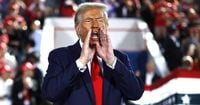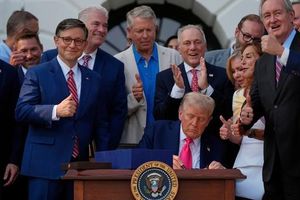In a dramatic escalation of tensions between the executive branch and its critics, former FBI Director James Comey now faces federal indictment, prompting an outcry from legal experts, civil libertarians, and political observers who warn that the U.S. Justice Department is being weaponized against perceived enemies of the president. The events of the past weeks have not only thrust Comey into the legal spotlight but have also drawn renewed attention to President Donald Trump’s public campaign against a growing list of political adversaries.
On September 25, 2025, Comey was charged with two felony counts for allegedly lying to Congress during 2020 testimony regarding his authorization of leaks to the press. According to CNN, these charges stem from Comey’s claim, while leading the FBI through politically charged investigations, that he had not approved such leaks. The indictment marks a new and dangerous phase in the administration’s approach to dissent, according to First Amendment attorney Floyd Abrams, who told CNN that the prosecution represents a “new and dangerous phase in the administration’s weaponization of the legal system.”
The legal and political backdrop is as contentious as it is unprecedented. President Trump has openly and repeatedly called for the prosecution of a range of opponents, from New York Attorney General Letitia James and Senator Adam Schiff to former CIA Director John Brennan and even former President Joe Biden. In the days leading up to Comey’s indictment, Trump publicly urged Attorney General Pam Bondi to move more aggressively against these figures—a move that many legal analysts see as eroding the long-standing firewall between the White House and the Justice Department.
“It’s clearly vindictive. It’s clearly his enemies list,” former federal Judge Shira Scheindlin told CNN, echoing a sentiment shared by other legal experts. Retired federal Judge John Jones was even more direct, stating, “It’s a better case for Comey, because the president won’t shut up. And that’s admissible, so he’s got a fighting chance, I think, on vindictive prosecution.”
Comey’s arraignment is scheduled for October 9, 2025. In the meantime, his attorney Patrick Fitzgerald has vigorously denied the charges, saying, “We look forward to vindicating him in the courtroom.” The defense’s strategy may hinge on the argument that the prosecution is not only selective but vindictive—a rarely successful legal maneuver, but one that experts say may have more traction given Trump’s highly publicized animus toward Comey.
Indeed, vindictive prosecution claims typically face steep odds. As Randall Eliason, a former federal prosecutor, explained to CNN, “It is a very hard motion to win because prosecutors are given a great deal of discretion in deciding what kind of cases to bring and which cases to bring. You’ve really got to prove bad motives on the part of the prosecution—that they’re really coming at you for some completely improper reason.” Yet, Eliason also noted that the current circumstances are extraordinary: “They’re picking their guy and then trying to find something they can charge him with, versus investigating these facts on the law and deciding whether charges are appropriate. The whole flip flop thing and picking a new US attorney who will do what the former US attorney won’t, I mean, that sets off all kinds of red flags.”
The personnel changes referenced by Eliason are not merely theoretical. In the Eastern District of Virginia, US Attorney Erik Siebert was pushed out amid pressure to bring charges against Letitia James. He was replaced on an interim basis by Lindsey Halligan, a Trump loyalist. This abrupt shift, legal observers argue, is further evidence of political interference in prosecutorial decisions. The drama in Virginia has already surfaced in other cases, such as that of Kilmar Abrego Garcia, whose attorneys cited the turmoil as part of their argument that their client was being unfairly prosecuted for challenging his deportation.
Other high-profile individuals have also found themselves in the crosshairs. As The New York Times reported, the Department of Justice recently subpoenaed records related to the travel history of Fani Willis, the Georgia district attorney who charged Trump in a sweeping election interference case. The scope of that investigation remains unclear, but the move is widely interpreted as another instance of the administration targeting political adversaries. Trump’s public statements have only fueled these perceptions. On September 15, 2025, he called for Willis’s incarceration, declaring, “She should be put in jail. She’s a criminal.”
Trump’s rhetoric has not been limited to prosecutors. He has also called for the investigation or prosecution of media figures and outlets. First Amendment lawyer Floyd Abrams, who has represented clients ranging from The New York Times in the Pentagon Papers case to Senator Mitch McConnell in Citizens United, told CNN that the administration’s legal and regulatory assaults extend well beyond Comey. The reinstatement of comedian Jimmy Kimmel, for example, does little to stem the tide of pressure on broadcasters and news media. Abrams warned, “No hypothetical abuse of presidential power is too outlandish to take seriously in the current context.”
For many observers, the cumulative effect of these actions is deeply troubling. The Justice Department, once celebrated for its independence, now appears to be at the center of a political storm. Judges, too, are being drawn into the fray. Legal experts told CNN that while claims of selective or vindictive prosecution are rarely successful, the unusually public and persistent nature of Trump’s campaign against his adversaries could make judges more receptive to such arguments. Scheindlin remarked, “He’s made it so obvious that he’s targeting them, regardless of the evidence, that I do think a judge would be far more receptive to probably both concepts, selective prosecution and vindictive.”
Yet, even as Comey and others prepare to challenge their indictments, the broader implications for the rule of law remain uncertain. The pattern of prosecutors departing under pressure, the replacement of career officials with political loyalists, and the president’s willingness to name and target his foes in public all suggest that the boundaries of executive power are being tested as never before. The outcome of these legal battles will not only determine the fate of individual defendants like Comey but may also set lasting precedents for the relationship between the presidency and the justice system.
As the nation watches these cases unfold, the stakes could hardly be higher. The independence of the Justice Department, the integrity of the legal process, and the very notion of equal justice under the law are all on trial alongside the individuals now facing prosecution.





